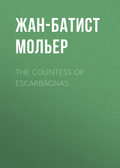
Мольер (Жан-Батист Поклен)
The Magnificent Lovers
Eri. You seem to me to propose some strange entertainment; for you never fail to introduce indifferently all that presents itself to you, and you have a kind welcome for everything. Therefore to you alone do we see all necessitous Muses have recourse. You are the great patroness of all merit in distress, and all virtuous indigents knock at your door.
Cleon. If you do not care to see them, Madam, you have only to say so.
Eri. No, no; let us see them. Bring them here.
Cleon. But, Madam, their dancing may be bad.
Eri. Bad or not, let us see it. It would only be putting off the thing with you. It is just as well to have it over.
Cleon. To-day it will only be an ordinary dance, Madam. Another time …
Eri. No more about it, Cleonice. Let them dance.
SECOND INTERLUDE
The confidante of the young Princess calls forth three dancers under the name of pantomimists; that is, men who express all sorts of things by their movements. The Princess sees them dance, and receives them into her service.
ACT II
SCENE I. – ERIPHYLE, CLEONICE
Eri. This is admirable! I do not think any dancing could ever be better; and I am glad to have them belonging to me.
Cleon. And I am very glad, Madam, for you to see that my taste is not so bad as you thought.
Eri. Do not be so triumphant. You won't be long before giving me my revenge. Leave me alone here.
SCENE II. – ERIPHYLE, CLEONICE, CLITIDAS
Cleon. (going to meet Clitidas). I warn you, Clitidas, that the princess wishes to be alone.
Cli. Leave that to me. I understand court etiquette.
SCENE III. – ERIPHYLE, CLITIDAS
Cli. (singing). La, la, la, la. (Affecting surprise on seeing Eriphyle.) Ah!
Eri. (to Clitidas, who affects to go away). Clitidas!
Cli. I did not see, you, Madam.
Eri. Come near. Where have you been?
Cli. With the princess your mother, who was just going towards the temple of Apollo, accompanied by a great many people.
Eri. Do you not think this one of the most charming places in the world?
Cli. Certainly. The two princes, your lovers, were there.
Eri. The river Peneus has here the most charming windings.
Cli. Very charming. Sostratus was there also.
Eri. How is it that he was not with us to-day?
Cli. He has something on his mind which prevents him from taking any pleasure in all those beautiful entertainments. He wanted to tell me something; but you have so expressly forbidden me to intercede for any one to you that I would not hear him, and I told him flatly that I had no leisure.
Eri. You were wrong to say such a thing to him, and you ought to have heard him.
Cli. I told him at first that I was not at leisure to hear him; but afterwards I listened to what he had to say.
Eri. You did well.
Cli. In fact, he is a man after my own heart; a man with all the manners and qualities I should like to see in all men. He never assumes boisterous manners and provoking tones of voice, but is prudent and careful in everything. He never speaks but to the point, is never hasty in his decisions, is never annoying by his exaggerations. However fine may be the verses our poets repeat to him, I have never heard him say, "This is more beautiful than anything that Homer ever wrote." In short, he is a man to my taste; and if I were a princess, I would not see him unhappy.
Eri. He is evidently a man of great merit; but what had he to say to you?
Cli. He asked me if you were very pleased with the royal entertainments that are offered to you. He spoke of your person with the greatest transports of delight, extolled you to the sky, and gave you all the praises that could be given to the most accomplished princess in the world, and with all this uttering many sighs which told me more than he thought. At last, by dint of questioning him in all kinds of ways, and pressing him to tell me the cause of his melancholy, which is noticed by everyone at court, he was forced to acknowledge that he is in love.
Eri. How, in love? What boldness is this? I will never see him again.
Cli. What are you offended at, Madam?
Eri. To be audacious enough to love me, and, moreover, to dare to say it!
Cli. It is not with you he is in love, Madam.
Eri. Not with me?
Cli. No; he has too much respect for you, and he is too wise to do such a thing.
Eri. With whom, then, Clitidas?
Cli. With one of your maids-of-honour, the young Arsinoë.
Eri. Is she so very beautiful that he can think none but her worthy of his love?
Cli. He loves her to distraction, and entreats you to honour his love with your protection.
Eri. Me!
Cli. No, no, Madam; I see that this offends you. Your anger forced me to make use of this subterfuge; and, to tell you the truth, it is you he loves to distraction.
Eri. You are an insolent knave to come thus to sound my feelings. Out of my sight this moment! Do you pretend to read people's thoughts and penetrate into the secrets of a princess's heart? Away with you; let me never see your face again… Clitidas!
Cli. Madam.
Eri. Come here. I forgive you this affair.
Cli. You are too kind, Madam.
Eri. But on condition – mind what I say – that you will never mention it to anybody, at the peril of your life.
Cli. Enough.
Eri. Then Sostratus told you that he loved me?
Cli. No, Madam; I must now tell you the whole truth. I got from him by surprise a secret he intended to conceal from all the world, and which he said he would wish to die with him. He was in despair when I wrenched it with subtlety from him; and, far from asking me to tell you of it, he entreated me with the most earnest prayers never to reveal anything to you; and I have committed a piece of treachery against him by telling you what I have said.
Eri. I am glad of it. It is by his respect only that he can please me; and if he were bold enough to tell me of his love, he would forfeit for ever both my presence and my esteem.
Cli. Do not fear, Madam …
Eri. Here he is. Remember, if you are wise, what I have forbidden you.
Cli. Certainly, Madam; I have no wish to be an indiscreet courtier.
SCENE IV. – ERIPHYLE, SOSTRATUS
Sos. I have an excuse, Madam, for daring to disturb your solitude. I have received from the princess your mother a mission which authorises the bold step I now take.
Eri. What mission is it, Sostratus?
Sos. To try, to learn from you, Madam, towards which of the two princes your heart inclines?
Eri. The princess my mother shows a judicious spirit in choosing you for such a message. This mission is very pleasant to you, no doubt, Sostratus, and you must have accepted it with great joy?
Sos. I have accepted it, Madam, because my duty obliges me to obey; and if the princess had kindly listened to my excuses, she would have appointed another for the task.
Eri. What reason could you have had, Sostratus, for refusing it?
Sos. The fear of not acquitting myself well.
Eri. Do you think that I have not enough esteem for you to open my heart to you, and say all you wish to know from me about the two princes?
Sos. As far as I am concerned, Madam, I have no desire to know anything; I only ask you what you think you can say in answer to the commands which bring me here.
Eri. Until now I have had no wish to explain myself, and the princess my mother has kindly allowed me to put off the choice which is to bind me. But I should be glad to show to everyone that I am willing to do something for your sake; and if you insist, I may give you this long expected verdict.
Sos. I will not importune you, Madam, and urge a princess who knows well what she has to do.
Eri. Yet it is what the princess my mother expects from you.
Sos. I told her that I was sure to acquit myself but badly of my message.
Eri. Well, tell me, Sostratus; you have far-seeing eyes, and I believe that there are few things that escape you. Have you not been able to discover what everybody is anxious to know? Have you no idea of the inclination of my heart? You see all the attentions that are bestowed on me, all the homage that is paid to me. Which of these two princes do you think I look upon with a most favourable eye?
Sos. The conjectures we make upon such matters generally arise from the greater or less interest we take.
Eri. Which would you prefer of the two, Sostratus? Tell me which one you would have me marry?
Sos. Ah! Madam! your inclination, not my wishes, must decide the matter.
Eri. But if I wished to consult you in this choice?
Sos. If you were to consult me, I should feel very much perplexed.
Eri. You could not tell me which of the two you think most worthy of preference?
Sos. If I were to be judge, I should find no one worthy of that honour. All the princes of the world would be too mean to aspire to you; the gods alone can pretend to you, and you would have from men but incense and sacrifice.
Eri. This is very kind, and I esteem you my friend. But I must have you tell me for which of the two you feel the greatest inclination, and which is the one you reckon your friend?
SCENE V. – ERIPHYLE, SOSTRATUS, CHORŒBUS
Cho. Madam, the princess is coming to fetch you to go to the wood of Diana.
Sos. (aside). Alas! how seasonably you came in.
SCENE VI. – ARISTIONE, ERIPHYLE, IPHICRATES, TIMOCLES, SOSTRATUS, ANAXARCHUS, CLITIDAS
Ari. You are asked for, my daughter, and there are some who are much pained by your absence.
Eri. I should think, Madam, that they only asked after me out of compliment, and that no one is as pained as you say.
Ari. There are so many entertainments made for your sake that all our time is taken up, and we have not a moment to lose if we wish to see them all. Let us enter the wood at once, and see what awaits us there. This is the most beautiful place in the world. Let us take our seats quickly.
THIRD INTERLUDE
The stage represents a forest where the Princess has been invited to go. A Nymph does the honours, singing; and to amuse the Princess, a small musical comedy is played, the subject of which is as follows: – A shepherd complains to two other shepherds, his friends, of the coldness of her whom he loves; the two friends comfort him; at that moment the beloved shepherdess appears, and all three retire to observe her. After a plaintive love-song, she reclines on the turf, and gives way to sweet slumber. The lover makes his two friends approach to contemplate the beauty of his shepherdess, and invokes everything to contribute to her rest. The shepherdess, on waking up, sees her swain at her feet, complains of his persecution; but taking his constancy into consideration, she grants him his wish, and consents to be loved by him, in the presence of his two friends. The Satyrs arrive, upbraid her with her change, and, distressed by the disgrace into which they have fallen, look for comfort in wine.
Climene, Philinte
Philinte
There was a time I pleased you well,
Content I lived, and loved the spell;
I had not changed for god or throne
The sway o'er you I held alone.
Climene
So, when by gentle passion swayed,
You held me dear above all maid,
The regal crown I would have spurned
If for me still your heart had burned.
Philinte
Another's faith hath cured the wound







